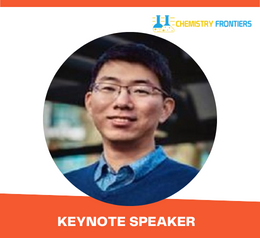Scholars
Frontiers in Chemistry Forum
THEME: "Excellence and Innovation in Chemistry"
 20-21 Jun 2022
20-21 Jun 2022  NH Potsdam, Berlin, Germany & Online
NH Potsdam, Berlin, Germany & Online THEME: "Excellence and Innovation in Chemistry"
 20-21 Jun 2022
20-21 Jun 2022  NH Potsdam, Berlin, Germany & Online
NH Potsdam, Berlin, Germany & Online 
The University of Adelaide, Adelaide, Australia
Title: Electrocatalytic Refinery for Sustainable Production of Chemicals
Cheng Tang received his B.Eng. and Ph.D. from the
Department of Chemical Engineering, Tsinghua University in 2013 and 2018,
respectively, under the supervision of Prof. Qiang Zhang and Prof. Fei Wei.
Currently, he is a postdoctoral researcher at The University of Adelaide
working with Prof. Shi-Zhang Qiao. His research focuses on functional
nanomaterials and carbon-neutral energy and chemistry, including 3D graphene,
single-atom materials, next-generation batteries, electrocatalytic refinery for
renewable fuels and chemicals, etc. He has published 1 authored book, 1 book
chapter and > 70 research papers in refereed journals (over 8300 citations,
h-index: 46, Google Scholar). He was awarded the 2020 World’s TOP 2% Scientists
(released by Stanford University), 2019 Chorafas Foundation Award in Chemistry,
the 2019 Springer Thesis Prize, the 2018 CPCIF-Clariant CleanTech Award, the
Top-Grade Scholarship at Tsinghua University (10/35000). Dr. Tang is named as a
2020 Global Highly Cited Researcher in Cross-Field (Clarivate Analytics).
Access to green, flexible and reliable energy and
chemicals is the key to global sustainable development and increasing
prosperity, especially in the post-COVID-19 and carbon-neutral economy. Aiming
at creating changes in energy technologies and chemicals manufacturing, we
proposed the electrocatalytic refinery (e-refinery) to defossilize, decarbonize
and decentralize present chemical industry. We for the first time established
the concept, principles, and methodologies of e-refinery. Based on it, we aim to
develop new technologies that can creatively produce some key chemicals (e.g.,
H2, hydrogen peroxide, ammonia, formate, urea) directly from
abundant sources (e.g., water, air, CO2) and powered by renewable
electricity.
Specifically, we developed an efficient e-refinery
strategy for producing H2O2 directly from water and
oxygen via two-electron oxygen reduction, which is of high flexibility to be
operated in small scales and on demand. Our work innovatively engineers the
structure of electrocatalysts at the molecular level, and has achieved present
best activity and selectivity (> 95%) for H2O2
production in both alkaline and acidic conditions. The obtained concentration
of H2O2 (> 1%) is high enough for practical
applications such as disinfection and electro-Fenton water treatment. Besides,
we also innovated the ammonia production technologies by electrocatalysis
directly from air (N2 and O2) and water. We proposed for
the first time bismuth catalysts for direct electrocatalytic nitrogen fixation
into ammonia at ambient conditions. To address the significant drawbacks of
tough N2 activation and poor NH3 selectivity, we developed a new
two-step process through integration of plasma oxidation with electrocatalytic
reduction, leading to ~2500 times higher yield and ~100% Faradaic efficiency.
All the research in materials design and mechanism elucidation are achieved by
combining atomic-level material engineering, electrochemical evaluation,
theoretical computations, and advanced in situ characterizations.